- New Sailboats
- Sailboats 21-30ft
- Sailboats 31-35ft
- Sailboats 36-40ft
- Sailboats Over 40ft
- Sailboats Under 21feet
- used_sailboats
- Apps and Computer Programs
- Communications
- Fishfinders
- Handheld Electronics
- Plotters MFDS Rradar
- Wind, Speed & Depth Instruments
- Anchoring Mooring
- Running Rigging
- Sails Canvas
- Standing Rigging
- Diesel Engines
- Off Grid Energy
- Cleaning Waxing
- DIY Projects
- Repair, Tools & Materials
- Spare Parts
- Tools & Gadgets
- Cabin Comfort
- Ventilation
- Footwear Apparel
- Foul Weather Gear
- Mailport & PS Advisor
- Inside Practical Sailor Blog
- Activate My Web Access
- Reset Password
- Customer Service

- Free Newsletter


Pearson 37 and 37-2 Used Boat Review
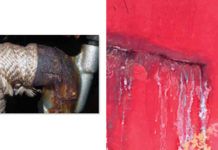
DIY Survey Checklist for Used-Boat Buying
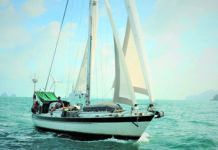
Valiant 40: Reshaping the Cruising Hull
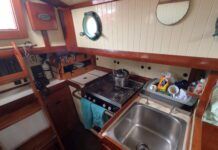
Bristol Channel Cutter 28: Circumnavigator’s Choice

Best Crimpers and Strippers for Fixing Marine Electrical Connectors

Thinking Through a Solar Power Installation

How Does the Gulf Stream Influence our Weather?

Can You Run a Marine Air-Conditioner on Battery Power?

Practical Sailor Classic: The Load on Your Rode

Anchor Rodes for Smaller Sailboats

Ground Tackle Inspection Tips

Shoe Goo II Excels for Quick Sail Repairs
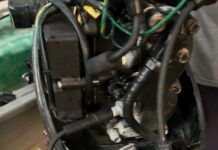
Dinghy Outboard Diagnostics
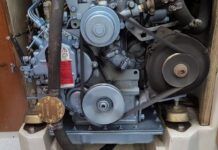
Spring Season Engine Start-Up for Winterized Engines

Solutions for a Stinky Holding Tank

Diesel Performance Additives
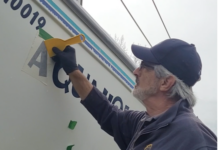
Vinyl Boat Lettering DIY Application and Repair

Those Extras you Don’t Need But Love to Have

Hidden Maintenance Problems: Part 3 – Gremlins in the Electrics

Three-Model BBQ Test

Alcohol Stoves— Swan Song or Rebirth?

Living Aboard with an Alcohol Stove

Preparing Yourself for Solo Sailing

How to Select Crew for a Passage or Delivery

Preparing A Boat to Sail Solo

Re-sealing the Seams on Waterproof Fabrics
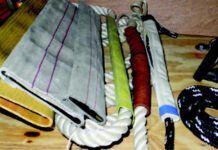
Chafe Protection for Dock Lines

Waxing and Polishing Your Boat

Reducing Engine Room Noise

Tricks and Tips to Forming Do-it-yourself Rigging Terminals

Marine Toilet Maintenance Tips
- Sailboat Reviews
The Catalina 25
Like most catalinas, the 25 represents good value for the money, but sailing performance and construction quality are average at best..
[Updated December 6, 2018]
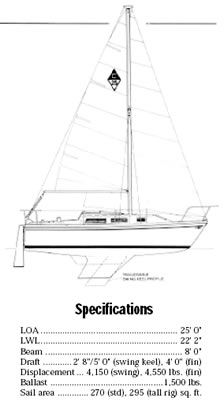
The Catalina 25 is not exceptionally fast, stylish, or spacious compared to newer widebody models, and while the construction and workmanship are adequate, they too are not exceptional. But because of the builders strict adherence to a philosophy of offering a relatively spacious design, relatively well made, at a reasonable price, and backing up the product with generally good customer service, the Catalina 25 has turned out to be one of the most successful small cruising sailboats ever built, with 5,332 boats sold between 1976 and 1990, when the company ceased producing the model as demand tailed off.
The Catalina 25 Design
During those 14 years of production, the design went through a complete metamorphosis, starting out as a very simple and inexpensive trailerable swing-keel design, and ending as a relatively sophisticated minicruiser. As vice-president and chief designer Gerry Douglas says, The last boats we built had diesel inboards, hot and cold pressure water systems, and extremely complex electrical systems. They were like little Catalina 34s. It was what people wanted in the late 1980s.
If you consider all model years, you can find Catalina 25s with five different keel configurations: cast iron swing-keel, cast iron fixed keel, cast lead wing keel, cast lead fin keel without glass jacket, and in later boats, a lead keel encased in fiberglass. In the later boats there was a choice of fin keel, wing keel, or swing keel, and standard rig or tall rig. However, the swing-keel model, with a board-up draft of 2′ 8″, accounted for well over half of total production. Most Catalina buyers over the years have been cruisers rather than performance-oriented racers, and for many cruisers, the attractiveness of a boat suitable for shoal waters and trailering is undeniable. Relatively few Catalina buyers are avid racers, it seems. If the hundred or so owners who answered our survey request are an indicator, only a small percentage rate as important either the fin keels much more efficient foil shape and lower turbulence, or the greater light-air efficiency of a two-foot longer tall rig mast that increases sail area by almost 10 percent.
As the design developed over time, features changed enough so that in a number of respects the early boats are very different than 1987 and later model years. As a consequence, its imperative for prospective buyers to know what model year theyre looking at when shopping for used boats. Prices can vary from less than $5,000 to more than $16,000, not only dependent on condition, but also model year and features.
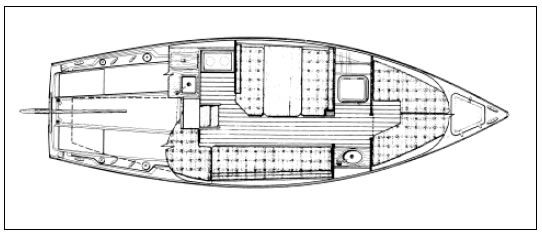
For example, at various times there was a choice of two different interiors: a dinette arrangement, and opposing settees. A flip-top (Catalinas version of the pop-top), which provided standing headroom, was a popular feature that was optional until 1987, at which time it became standard. In fact, in 1987 the entire boat underwent a major design change, yielding among other things a more contemporary deck and a more refined interior, with less teak and more fiberglass.
Performance and Handling of the Catalina 25
The Catalina 25, with a PHRF rating of around 228 for the standard rig or 222 for the tall rig, is not especially fast for its size. In fact, the swing-keel version, which is noticeably slower upwind than the fin-keel version, probably deserves an even higher time allowance than its been given. The fin keel is generally acknowledged to sail close to its rating, at least once the breeze pipes up to 10 knots or so. The swing keel is not as hydrodynamically sleek, and the keel lifting cable is out in the open where it causes extra drag, intensified if seaweed gets hung up on it.
The boat (especially the keel version) balances relatively well, tracks satisfactorily, and is quite maneuverable if sails are properly trimmed; it can be unforgiving if they are not. Several owners com plained to us of a heavy weather helm in a breeze.
The tall rig is a bit more tender than the standard rig, but definitely adds speed in light air. One just reefs a little earlier to maintain helm balance. But despite its virtues, the tall rig has a drawback mentioned by several owners: Unless you have a sailmaker chop off the bottom 12″ of the sail, the boom swings too low over the cockpit. This, however, may be the fault of some sailmakers; the consensus is that Catalina-supplied sails were not as well-made or well-shaped as those obtained from other sailmakers.
Under power, the Catalina 25 will make about 5- 1/2 knots with a 6-hp. outboard, and you can coax an extra 1/2 to 3/4 knot or so out of the boat with an 8- hp. or 9.9-hp. engine. (Theoretical maximum hull speed in ideal conditions is around 6.3 knots.)
The outboard is mounted on a fold-up transom bracket mounted off center to accommodate the outboard rudder. Some owners complained that the motor is difficult to raise and lower. Others observed that, in rough seas, when the boat pitches, an ordinary 20″ shaft outboard prop has a tendency to ventilate, particularly if the auxiliary is used under sail and the boat heels away from the side on which the engine is mounted. The owner consensus is that a 25″ extra long shaft largely solves that problem.
An inboard diesel engine would also solve the problem, but is not recommended; an owner of a 1986 model equipped with a 10-hp. Universal engine reports his boat is very slow under power, at least with the two-blade prop hes currently using. A three-blade prop might help, but would also significantly increase drag under sail.
Another disadvantage of the transom-mounted outboard is that its difficult for the helmsman to control. One owner who told us hed rigged remote engine controls in the cockpit said, Its the best thing weve done.
The boat needs to be reefed in 15 knots of wind (a jiffy reefing main was standard in later boats, though a roller furler for the jib was not). Above 15 knots, weather helm becomes very heavy if the main is left unreefed; one owner observed that she tends to round up in strong winds, or if heeled more than 15 degrees.
A short traveler is integrated into the stern pulpit, and although this works well while cruising, and
permits use of a bimini to protect crew from too much sun, mid-boom sheeting and a mid-cockpit traveler work better for single-handed daysailing and racing. Consequently, many owners have added the inboard traveler, some with a snap-on mainsheet block so they can switch back and forth.
A peculiarity of the design is that the distribution of the boats components evidently caused listing, in some boats to starboard, in others to port. For example, in the 1981 dinette model, owners complained that the dinette, engine, fuel tank, galley, and head were all on the port side, causing the boat to list noticeably to port. Catalina evidently took these complaints to heart, but the results were not totally effective; an owner of a 1982 model complained that batteries, holding tank, and outboard on the starboard side produced a list in that direction.
Other owner responses to our questionnaire included the following:
The absence of a bridge deck is a possible safety hazard when sailing offshore in a big following sea.
Narrow (7″ wide) sidedecks make going forward somewhat difficult. So do the 22″ high stanchions when the boat is heeled, impeding passage forward on the high side; shorter stanchions would help, but wouldnt be as safe.
The lifelines don’t lead to the top of the bow pulpit, but instead run to the deck at the bow to provide a slot for a deck-sweeping genoa. This can make the foredeck area insecure in adverse weather conditions. Bails on the top of the pulpit and pelican hooks on the lifelines would be an improvement, since it would then be possible to raise the lifelines in heavy weather or when a high-clew jib is being used.
Catalina 25 Interior
Compared to other boats available in the 1970s an early 1980s, the Catalina 25 is relatively spacious below, though some readers complained that the aft double is really only a single quarter berth and that the port side settee berth is not long enough for an adult. Newer beamier designs, of course, have the advantage of more elbow room below.
At least one owner improved sleeping accommodations by building a plywood platform which fits between the table on the port side and the settee on the starboard. The aft berth cushion, under the cockpit sole, was shortened slightly to fit on this platform. When in place, the platform results in an athwartships berth about 6′ 4″ long and 5′ 1″ wide, big enough for a double sleeping bag. When not in use, the plywood platform stows on the aft berth.
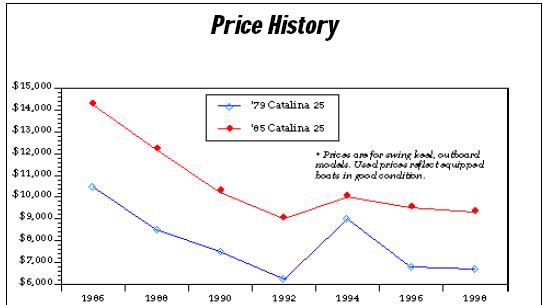
Light and ventilation below is very adequate, as long as theres a breeze from forward. Because the forward hatch slopes down the forward edge of the cabin trunk, when open it becomes a very effective windscoop. Boats with pop-tops have additional ventilation.
The pop-top was an extra-cost option, and a very popular one. Reader praise of the pop-top is almost universal, with comments from Buyer interest is much higher on boats with pop-tops to Contrary to what some folks say, this pop-top does not leak in the rain or spray. Headroom is 6′ 4″ with the pop-top raised.
Until the 1983 model year, when the company redesigned the icebox so it would, as one owner reported, keep block ice for three days, the icebox was severely under-insulated; many owners reported that it would only hold ice for less than a day. Another complaint was that the icebox drains directly overboard, and as a consequence, if the drain is left open when the boat heels, water enters the icebox. One reader killed two birds with one stone: We keep our trash in the built-in cooler where it is out of sight, and use an Igloo cooler which is bigger and works better.
Construction of the Catalina 25
The Catalina 25 has a full fiberglass hull liner, which makes it easier to keep the boat clean but at the same time can make repairs and adding owner-installed custom components more difficult.
Several owners judged that Florida-built Catalina 25 hulls, though adequate in strength, are not as well finished as the California-built boats. And several others commented on gel coat chipping and cracking, voids, pits, and crazing, particularly in stressed areas such as at sharp changes of direction in the cockpit, and corners of hatch covers, though these problems didnt seem to be a function of builder location.
Bottom blistering seems to have been a fairly common problem on Catalina 25s when an epoxy bottom coat had not been applied under the antifouling paint to prevent water incursion. Catalina now has a 10-year no-blister warranty, but during the era of the Catalina 25, the company had a five-year warranty with gradually diminishing payments during the period. Judging from reader response to our questionnaire, some owners were not entirely satisfied with that arrangement.
In the swing-keel version, Catalina used an ordinary galvanized steel trailer winch to hoist the keel, and although there are no doubt some 20-year-old boats that still have the original winch, many owners have had to repair or replace some or all of it, particularly when the boat is sailed in saltwater.
Another problem with early swing keel models involved breaking the pennant. At the lifting point on the trailing edge of the swing-keel there is a tapped hole on a flat area into which screws a stainless steel eye. A swaged fork fits over the eye and pivots on it as the keel swings up or down. The factory fixed the eye in place with Loctite, but over the years the eye could rotate, so that the clevis pin became parallel to the keel instead of perpendicular to it. Then it would bind, and eventually end up bending and then breaking the wire at the joint of the wire and the swaged fitting. To solve the problem, Catalina came up with a device to keep the eye from rotating, but some older boats may not be retrofitted. Owners and prospective buyers of older boats should examine the swing keel to be sure the eye is solidly fixed in place.
Several owners complained that there is no mechanical lock to stop movement of the swing keel,
which even at anchor can move laterally in its trunk, banging, thumping, and making it, according to one owner, hard to sleep through the night. Catalina offers a retrofit kit to alleviate the problem, composed of nylon or neoprene washers -but according to some owners, this cure is only partially effective.
The surface of the cast iron swing keel was said by some of the performance-oriented owners to be comparatively rough as it came from the factory. They advise filling and sanding fair and smooth for better sailing speed. We would add that the keel should be checked regularly for corrosion, and an epoxy barrier coat should be maintained on the surface to prevent excessive rusting and deterioration.
Deck and cabin hardware, while generally adequate, is considered sub-par by some owners, particularly on the early models. For example, the type of closed-barrel turnbuckles Catalina used are hard to inspect without disassembly, and as a result tend to corrode internally, sometimes freezing or completely failing. Later models have the open-barrel type, which is preferable.
The forward hatch for several model years was attached with self-tapping screws rather than throughbolted, causing the hatch to become loose in some cases. By 1983, bolts had replaced the screws. Other relatively common complaints include rusty screws on deck fittings, broken boom goosenecks, insufficient bow eye backing plates, tillers splitting (on one boat the tiller split twice), and problems with rudders delaminating and splitting along the edge.
A particularly common problem noted is that rudder gudgeons and pintles break or come adrift
from the transom. The repair involves installing a handhole inspection port on the inside of the transom to gain access to the fastening bolts. One reader said his lower pintle had broken under racing conditions, but that he had cured the problem by adding a third pintle and gudgeon halfway between the top and bottom fittings.
Several other readers reported that their boats had loose gudgeon bolts, stress cracks in the transom at the gudgeon attachment points, and transom leaks. One owner reported the transom cracked below the motor bracket because of lack of reinforcement behind the bracket.
The hull-deck joint on some models used selftapping screws rather than through-bolts. Several readers experienced rain and spray leaks along the rail. Portlights also have been a source of leakage problems, as have cockpit scuppers, rudder gudgeons, and various pieces of dealer-installed deck hardware, mostly due, we guess, to inadequate bedding procedures and backup plates.
Trailering the Catalina 25
Despite the fact that a bare Catalina 25 weighs approximately 4,150 lbs., the boat plus trailer, loaded for a weeks cruise, can easily weigh over 6,000 pounds. That means its necessary to tow with a big pickup or van equipped with a towing package, and virtually eliminates prospective trailer-sailors who only have access to an ordinary passenger vehicle, no matter how powerful. (An exception: Big cars built before the advent of downsizing and integral frames. For example, one reader says he pulls his 6,000-lb. rig successfully with a 1973 Olds 98).
The Catalina 25s mast is deck-stepped on a hinge, but several readers complained that no factory method is offered to make mast-raising safer and easier. Still, some owners have devised their own systems, with which they seem to be satisfied. One who made extensive modifications figures it takes him a mere 45 to 60 minutes from the time he pulls into the parking lot at the launching ramp until hes sailing away-and only a little longer than that to reverse the procedure.
One reader pointed out that with the swing keel model the rudder is deeper than the retracted keel (unless its a folding rudder, which Catalina offered as an option in some model years), which can produce problems at the launching ramp under some conditions. Another owner feels that his fin-keel is as easy to ramp-launch as a swing keel, provided an extra-long trailer tongue extension is used. We think that might be true on some ramps, but not on others.
If youre shopping for a Catalina 25 already equipped with a trailer, check the GVWR (Gross
Vehicle Weight Rating) decal before you buy. It indicates the loaded weight of the trailer in pounds, i.e. the sum of the carrying capacity of the trailer plus the weight of the trailer itself. One reader ordered (from a Florida dealer) and paid for a trailer with a 7,000 lb. capacity rating. What he got was one rated for only 5,000 lbs. He was prompted to check the decal because, he says, The trailer looked skimpy. He weighed the combination with the boat stripped and it came to 5,620 lbs. The dealer claimed it was the same trailer they always use for this boat an the dealer passed me off to the Florida plant, who passed me off to the trailer manufacturer, who finally made good after Frank Butler got into the act-after seven months of hassling.
New or unseasoned sailors making their first or second foray into the boat-buying game may find that the Catalina 25 is an attractive choice. The boat is relatively easy to handle, can be single-handed without too much trouble, and while not fast in the racing sense, is fast enough to satisfy many cruisers. The interior is big enough for two to cruise in relative comfort, while the overall size of the boat is not daunting to most newcomers to the sport. Other advantages for new sailors are that Catalina, in most cases, does a good job with customer service, and theres a quarterly 100-page glossy publication for all Catalina owners (from 8′ Sabots to all the way to Catalina 42s) called Mainsheet which offers support and helps to keep communications open between owners.
Asking prices on used Catalina 25s range from around $4,000 for older (late 1970s) models that probably need some work, to around $16,000 for newish (late 1980s) models fully equipped and in like-new condition, probably with an inboard engine and a trailer included. A price of $7,000 to
$8,000 is typical for early to mid-1980s boats, though we noticed a wide range, presumably based on condition and accessories.
Prospective buyers should check for bottom blisters (which can be expensive to repair), evidence of problems around the keel bolts or pivot on the swing keel, rudder connection problems, cracks in turnbuckles or rigging terminals, leaks around windows and hull-deck connection, and other common (and correctable) flaws.
Also check for which of the many extra-cost options have been installed-options which many experienced sailors would say should have been standard: boom vang, genoa winches, pop-top with canvas enclosure (originally two separate options), basic electrical system with running lights and cabin lights, galley equipment, head, lifelines and stanchions, and sails. Check especially the brand of sails; many readers report that they have been dissatisfied with Catalinas own brand of sails.
Overall, we think the Catalina 25 is not fancy or fast, but is economical, a fair sailer, and roomy for its size-a good boat for non-racers who don’t have a big budget and for relatively new sailors who want to get their feet wet in the sport.
RELATED ARTICLES MORE FROM AUTHOR
12 comments.
Mr Nicholson,
Thank you for the report on the Catalina “25” I’ve Been searching for an older (less expensive) under 30’ single handed sailboat for the past several months and finally today someone posted a Catalina 25’ on buy, sell, or trade in the Destin Florida area. The elder gentleman wanted to restore it but a bad hip has preventing that, so he sold it to me. I started sailing about 20 years ago with a Balboa 27’ with a swing keel (what a life saver). Lost it in the divorce. There are many sand banks and shoals here in Choctawhatchee Bay and a swing keel is what a newbie needs. I don’t think this Catalina has a swing keel, at least I don’t see the crank in the cabin. The ships dimensions in your report help immensely. I have not done an inventory yet on board (they left a lot of stuff) I hoping the main is useable and I have already inspected and cleaned the storm jib, I don’t see a Genoa (Bimini) or any other jib sail hidden away. Anyways, thanks for your report I look forward to getting it under sail.
We’ve had a 1985 Catalina 25 swing keel since 2006. I’ve sailed a lot of different boats over more than fifty years. This boat has been a good investment for fun and reliability. I’ve never reefed in the near fifteen years sailing it on the Monterey Bay. We’ve burried the rails on more than one occasion and while it does weather helm in heavy winds, it’s easily managed and I’ve never been worried about a knockdown.
Have 1985 Catalina 25 swing keel, #K4978. I don’t know if it’s the standard or tall rig. Can I tell from the HIN#?
i am new owner of a 25ft 1981 catalina and i need 1 simple measurement .. height of wing keel from the bottom of keel to the bottom of the boat as i am building a trailer to get it home with..
sorry fin keel
I am looking to buy a fixed keel Catalina 25. The keel seems short ar 4 ft when I would have expected 5 ft for a boat this size. My question is does this make the boat more tender with ballast less lower in the keel. And how does this affect performance say against the swing keel model
Did you get to sail ‘er this summer? We have a 1980 fin keel and as long as your co-captain doesn’t mind 10 to 15 degree heel, you’re not afraid to reef the main in a blow and you’re not sailing in a hurricane, you’ll find that 4 feet of keel is plenty.
Hi Peter, We’ve had our 1986 C25 SR SK for four years now. Our mooring mates have an 81 TR FK and we oftentimes run them together. While the Tall Rig makes theirs a little tender, proper trim seems to mitigate most puffs. As for our Swing Keel, typically deployed fully, we notice we cannot point as high but routinely we are keeping up around 6kts. I do notice in the SK, with the other owners aboard, that we have gain positive comments for our sails so I guess that is where you have a tough time making scientific comparisons, lots of variables. We have an even less fair comparison, a C25 Capri who has newer nicer sails and a seasoned skipper who wins most regattas and that fin easily allows him to point with a larger sail plan. The more I write, the less I think this will help you; however, for a swing keel, we’re plenty happy from a non-competitive perspective and don’t have envy/regrets when looking on those with fixed.
We have a Catalina 25 from 1983. We are in a humid area. We love the boat! Our son wants to add an air conditioner of some form to make it more tolerable to sleep on hot nights. I do not want to overwhelm the interior where I sit at the table to prepare meals and do artwork. What suggestions might you have for our situation? Thank you!
Pardon it is an 89 not an 83 Catalina !
I have a 1985 22ft and the cable for the keel broke can this be loaded onto a trailer?
LEAVE A REPLY Cancel reply
Log in to leave a comment
Latest Videos
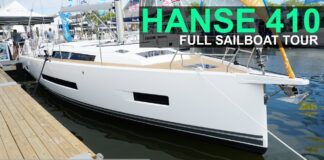
Hanse 410: What You Should Know | Boat Tour

Sailboat vs Fishing Boat – Rules of the Road

Catalina 445: What You Should Know | Boat Review

How to Wax and Polish Your Boat
- Privacy Policy
- Do Not Sell My Personal Information
- Online Account Activation
- Privacy Manager
Catalina 25
The catalina 25 is a 25.0ft masthead sloop designed by frank butler and built in fiberglass by catalina yachts between 1978 and 1994., 5866 units have been built..
The Catalina 25 is a light sailboat which is slightly under powered. It is very stable / stiff and has a good righting capability if capsized. It is best suited as a day-boat.
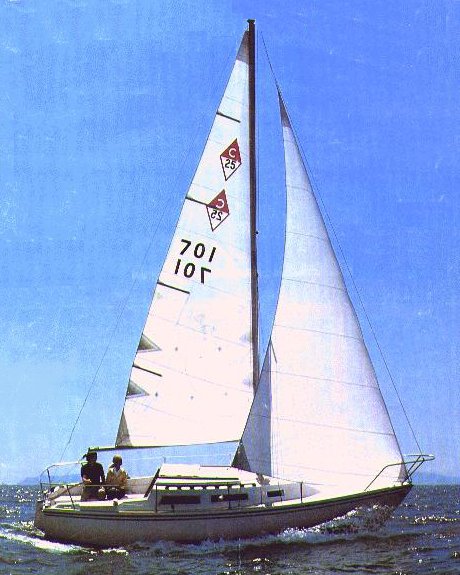
Catalina 25 for sale elsewhere on the web:

Main features
| Model | Catalina 25 | ||
| Length | 25 ft | ||
| Beam | 8 ft | ||
| Draft | 4 ft | ||
| Country | United states (North America) | ||
| Estimated price | $ 0 | ?? |
Login or register to personnalize this screen.
You will be able to pin external links of your choice.

See how Sailboatlab works in video
| Sail area / displ. | 15.78 | ||
| Ballast / displ. | 41.76 % | ||
| Displ. / length | 186.41 | ||
| Comfort ratio | 19.14 | ||
| Capsize | 1.93 |
| Hull type | Monohull fin keel with transom hung rudder | ||
| Construction | Fiberglass | ||
| Waterline length | 22.17 ft | ||
| Maximum draft | 4 ft | ||
| Displacement | 4550 lbs | ||
| Ballast | 1900 lbs | ||
| Hull speed | 6.31 knots |
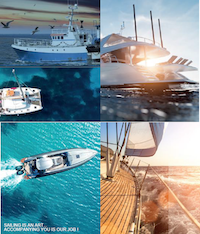
We help you build your own hydraulic steering system - Lecomble & Schmitt
| Rigging | Masthead Sloop | ||
| Sail area (100%) | 270 sq.ft | ||
| Air draft | 0 ft | ?? | |
| Sail area fore | 152.25 sq.ft | ||
| Sail area main | 118.12 sq.ft | ||
| I | 29 ft | ||
| J | 10.50 ft | ||
| P | 24.66 ft | ||
| E | 9.58 ft |
| Nb engines | 1 | ||
| Total power | 0 HP | ||
| Fuel capacity | 0 gals |
Accommodations
| Water capacity | 0 gals | ||
| Headroom | 0 ft | ||
| Nb of cabins | 0 | ||
| Nb of berths | 0 | ||
| Nb heads | 0 |
Builder data
| Builder | Catalina Yachts | ||
| Designer | Frank Butler | ||
| First built | 1978 | ||
| Last built | 1994 | ||
| Number built | 5866 |
Other photos
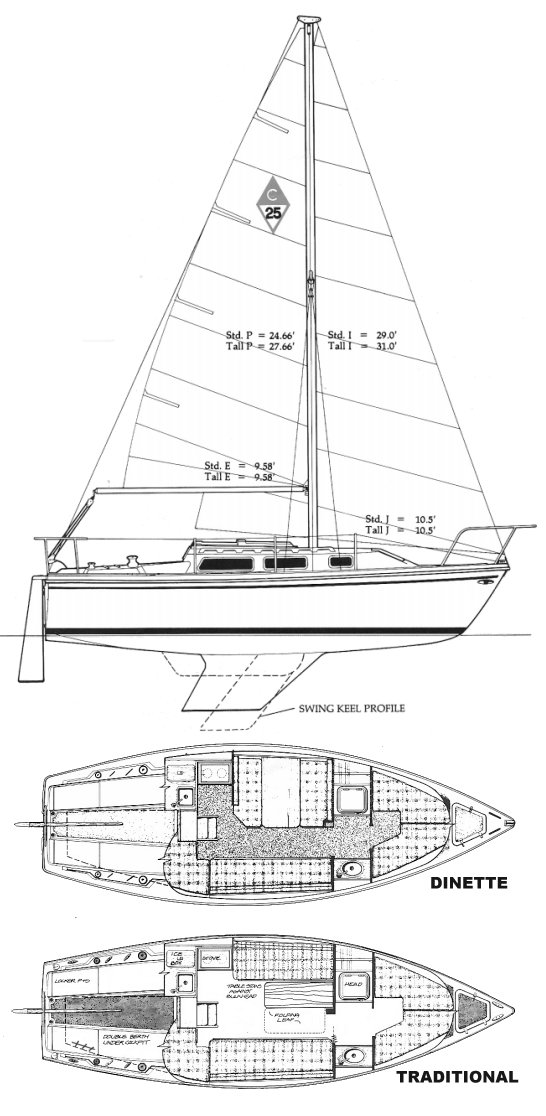

Modal Title
The content of your modal.
Personalize your sailboat data sheet
Which Sailboat?
Catalina 25 Review

The Catalina 25 is a good racer/cruiser for inland and coastal waters available on the used market at very affordable prices. This sailboat benefits from a large user base, active owner’s forum, and easy availability of spare parts.
Designed by Frank Butler of Catalina Yachts in Hollywood, CA, over 6,000 Catalina 25s were built from 1976 through 1990, and all in the U.S. She is designed as an inland and coastal racer/cruiser within budgetary reach of any American. She is well suited to her purpose in terms of design and build quality although some owners have sailed their Catalina 25s through the Caribbean ( like this fellow ), to South America, and even to Hawaii. The Catalina 25 was one of the most successful and longest running production boats ever built, and continues to have a strong following and interest. The standard rig with swing keel configuration is the most popular.

The Catalina 25 has a huge user base, a very active owners’ association with racing, and a plethora of information available about maintenance on their forum (located here ). Unlike many builders of used sailboats on the market today, Catalina has remained in business and continues to manufacture and source parts for the Catalina 25. Catalina owners benefit from Catalina Direct , which makes buying many Catalina 25 specific parts very convenient. As an aside, note that Catalina Direct is a dealer for Catalina Yachts and is not run by Catalina, the manufacturer. Many owners of the Catalina 25 report that the plethora of information available on their very active owners forum and the multitude of users eager to help, that the manufacturer was still in business, and that spare parts were readily available, were key points influencing their decision to purchase a used Catalina 25.

The Catalina 25 is a masthead sloop with a modern but conservative design, resulting in a boat that continues to have a relatively modern appearance. She has a modern canoe underbody and broad transom. With a waterline length of 22’2”, her length on deck to waterline ratio is equally modern. Other design elements include a traditional sheer line, a slightly raked bow, a plumb stem with stern hung rudder, and the standard well-known Catalina cabin trunk and port configuration. Like other Catalina sailboats built during this time, the earlier aluminum trimmed salon ports were later updated to smoked plexiglass.
CONSTRUCTION
Construction quality is good for the Catalina 25’s intended purpose as a racer/cruiser in protected and coastal waters. The hull is constructed of solid fiberglass and the deck is wood cored. No reports of oil-canning, hull flexing, or other structural problems exist for the Catalina 25. The deck is joined to the hull by a shoebox-type flange, sealed with polyester putty, and mechanically connected with self-tapping screws or through-bolts. The interior is a liner set into the boat before the deck is installed, which is a standard for Catalina and other production builders in the industry. Although liners reduce access to the inside of the hull, Catalina 25 owners report it is of little consequence on a boat this size as most areas can be accessed by some angle or another.
Minor blistering was an issue on some earlier Catalina 25s, but not all. Due to the long production run and improvement of fiberglass technology during this time, blistering issues were reduced in each successive year, and were nearly non-existent by the end of the run. A 1987 Catalina 25 hauled after years of neglect and very few blisters were present. Despite the wood coring, soft decks are not a common problem on Catalina 25s. Catalina 25s rarely have core rot after years of neglect.

The mast is deck stepped on a stainless steel tabernacle with a keel-stepped wooden compression post. The tabernacle allows the mast to be raised and lowered, which owners report takes about five minutes after learning how. The mast has one set of spreaders and is supported by three sets of shrouds, two sets of lowers and one set of uppers. Catalina 25s were rigged with high quality stainless steel. Jib car tracks are outboard, but due to the relatively narrow side decks, this likely does not compromise sheeting angles significantly and makes going forward easier.
Catalina offered some variation in rigging. A standard rig and a tall rig were offered. To provide increased sail area, the tall rig mast is approximately two feet taller than the standard and the boom is attached to the mast approximately one foot lower than the standard. Some Catalina 25s came from the factory with internal halyards while others are external. Some came with an adjustable backstay while others did not. Some lacked a boom vang. All came with hank on foresails although many owners have retrofitted roller-furling systems. Early Catalina 25s appear to have lacked backing plates for deck hardware while later boats came from the factory with backing plates installed. Either way, most owners of earlier Catalina 25s have installed backing plates where they were lacking. All running and standing rigging components continue to be available from Catalina Direct.
The Catalina 25 came in three keel configurations, initially a swing or fin keel, and later a shoal draft wing keel that replaced the swing keel model. The keel bolts on the fin keel were not originally stainless steel and were prone to rusting, but stainless steel was used in later models.
The fin is a relatively modern fin type design, deep but not too long, drawing 4’, connected to the hull by five bolts, and providing a very respectable ballast-to-displacement ratio of 41%. Although not as short or deep (high aspect) as more modern designs, the longer design (lower aspect) permits a stronger connection to the hull that better withstands groundings and other stresses unlike more aggressive high aspect designs.
The fin keel was originally cast iron, but in the early 1980s the design was improved so that the core of the fin was cast iron, which was then encased in lead, and then encased in fiberglass. Earlier boats with cast iron keels should have protective anodes installed if not already done. Many owners have encased their cast iron keels in barrier paints to stave off rust, which efforts appear to be largely successful.
The wing keel is roughly as long as the fin, but reduces draft to 2’10” and gives a very respectable ballast-to-displacement ratio of 40%. Fin-to-wing keel conversion kits are no longer manufactured but continue to be available on occasion. Some stiffness is lost when converting to a wing keel.
The swing keel model deserves a separate discussion. Ballasted swing keels have been relatively rare designs, especially as their contribution to the overall ballast of the boat increases. However, a dedicated following for ballasted swing keel performance cruisers continues to enjoy the boats built by Southerly Yachts in England for the premium blue-water boat market. Also, Jeanneau Shipyard in France has just launched a ballasted swing keel in their Sun Odyssey line which may indicate a return in interest to the advantages of a ballasted swing keel boat.

On the Catalina 25, the swing keel is cast iron, and pivots from a down position to an aft-and-up position on a 1” diameter cast bronze rod hung between stout cast bronze hangers mounted to the underside of the hull. When down, the keel provides a 5’ draft, which is deep for a boat of this size. The keel weighs three quarters of a ton and serves as all of the ballast for the boat, giving these models a modern ballast ratio of 36%. The heavy weight of the keel prevents many of the annoying banging noises associated with unballasted swing keels. The keel can be raised by way of a simple and reliable manual winch system located below the companionway steps. Little effort is required to operate the winch. When the keel is fully raised to its horizontal position, the Catalina 25 has a draft of only 2’8”, which is of course handy for gunkholing or if the water gets shallow when exploring. In the event of a grounding, the keel gently swings back and away rather than getting damaged or causing damage to the hull as can happen with fixed keels.
When the swing keel on the Catalina 25 is fully lowered, the keel orientation is high aspect and has a symmetrical foil shape, similar to modern race boats, so that the boat points to weather extremely well and tacks on a dime. When completely raised, only a small part of the keel is enveloped in the hull, with the rest protruding. So therefore when the keel is fully raised, the keel orientation is very low aspect, essentially a full keel configuration, enabling the boat to track well with little helm attention, even when sailing downwind.

Catalina recommends that Catalina 25 swing keel hardware be inspected every two years if in a salt water environment, and allows for longer if in fresh water. However, some owners in fresh water environments report never inspecting their swing keels after thirty years of use and have no problems. Catalina also recommended a retrofit be performed on earlier Catalina 25s to reduce the side-to-side movement of the keel along the pin, which could cause the keel to wear through the pin. If not already done, owners should perform or have this retrofit performed and a kit is available from Catalina Direct. Despite the swing keels being cast iron, Catalina did not typically install a sacrificial anode on Catalina 25s at the factory. Catalina 25s should have a sacrificial anode installed, especially if in salt water, although owners of fresh water boats without sacrificial anodes have reported little corrosion. Sacrificial anode kits, including the drill bit necessary to go through the cast iron, are available from Catalina Direct.
Interestingly, the swing keels themselves were cast in Mexico and shipped to Catalina. Some keels have the word “MEXICO” cast into their side, which is not usually apparent if the keel has been faired.
The Catalina 25 came with a transom hung unbalanced spade rudder. The rudder draws 2’10” so that it is somewhat protected by the keel, even the swing keel when raised fully. The unbalanced rudder can require some effort if sail trim is not correct, or when racing or in rough weather. Some Catalina 25 owners have upgraded to a balanced rudder, which they report enables steering with just one finger. Balanced rudders are available from Catalina Direct.
SAILING CHARACTERISTICS
All three keel configurations sail well on any point of sail and owners consistently refer to the boat as “forgiving”. Catalina 25 owners disagree as to whether the fin keel or the swing keel point to weather better. Racing ratings indicate that the fin is the best performer with the swing keel close behind. The masthead sloop configuration means a headsail is required for best performance. With both the approximately 16:1 sail-area-to-displacement ratio of the standard rig and the approximately 17.75:1 ratio of the tall rig, in either configuration the Catalina 25 easily achieves hull speed in anything but the lightest of airs. The relatively flat canoe body and beam carried aft cause Catalina 25s to have good initial stability. The 36-41% ballast-to-displacement ratios mean Catalina 25s are stiff, and if knocked down, quickly right themselves. The swing keel configuration is the stiffest, followed by the fin keel, and then the wing keel. Many Catalina 25 owners report preferring to reef when winds reach above 15 knots. The original mainsail provided by Catalina is a little baggier, even when new, than many sailors would prefer. This was reportedly done intentionally by Catalina to improve Catalina 25 downwind performance to the slight detriment of windward performance.
AUXILIARY POWER
Most Catalina 25s are powered by an outboard motor on an adjustable mount. Most Catalina 25 owners prefer a motor close to 10hp, which easily drives the boat at hull speed, even in rough conditions. Some owners report 6hp is sufficient in calm waters. A long shaft outboard with a shaft length of at least 25″ is preferred to keep the prop in the water in rough conditions. Roughly 150 Catalina 25s were delivered from the factory with an inboard diesel, which was located behind the companionway steps beneath the cockpit sole. Engine access for the inboards is expectedly cramped, but decent from the quarter berth and the companionway steps. A few Catalina 25s appear to have factory-installed sail drives, or perhaps undocumented refits to sail drives by previous owners. Catalina 25 owners who are active in racing prefer the outboard motor because the increase in PHRF rating, which is not always given by a race committee, is not typically enough to offset the drag caused by the inboard’s prop. Outboard motor mount kits for owners upgrading 2 stroke motors to heavier 4 stroke motors are available from Catalina Direct.

The Catalina 25 was partially marketed as a trailer-sailer. All three keel configurations have been pulled on trailers regularly by their owners, but the swing keel model is by far most popular for trailering. However most Catalina 25 owners do not report trailering their boats with great frequency, likely due to the boat’s weight requiring a substantial tow vehicle and dual-axle trailer. Some owners report their total trailering weight to approach 8,000 lbs, considering the weight of the boat itself, the trailer, and the equipment, gear, and supplies stowed on the boat. In addition, stepping the mast is more complicated than a day sailer, requiring the use of a special rig to handle the large mast, which is available from Catalina Direct or can be built at home by an owner with designs available on the Catalina 25 forum. (For a more trailerable Catalina, see the Catalina 22 .)

A pop-up cabin top was an option on early models and later became standard. The pop-top is another interesting Catalina 25 feature that deserves its own discussion. The pop-top raises head room in the salon to 6’4″, improves ventilation mightily, and enables a 360 degree view of the outside of the boat while standing below. The Catalina 25 can be sailed with the pop-top up, but only in light airs because it requires disconnection of the boom vang. Some Catalina 25 owners report raising the pop-top partially so that they have standing head room below but have protection from rain. An optional pop-top tent allowed the pop-top to remain up while keeping the salon protected from the elements. However, the pop-top does introduce an element of risk if the boat were turtled, but a boat designed for inland and coastal waters is not likely to see conditions that would cause turtling. If one intended to take the boat beyond coastal cruising, a model without a pop-top may be preferable.

Fit and finish of the Catalina 25 is not luxurious but is better than expected at this price-point. Wood trim is solid teak and bulkheads are teak-veneered marine grade plywood. Accommodations are typical but very good for a boat of this size due to its moderate freeboard and beam carried well aft. The original Catalina 25 marketing materials indicate the boat sleeps five, although one owner reported regularly sleeping with his wife and five children on the boat, as well as two guests on one occasion. The accommodations should be acceptable for any average-sized couple or typical family.

The Catalina 25 cabin sole is the pan liner and has a respectable wood-like look modeled into it, patterned after a teak and holly sole. The settee and berth cushions are 3” foam, which some owners have upgraded to 4”. The original cushion covers vary from the what would now be considered hideous, patterns of the late 1970s and early 1980s, to the more acceptable patterns of the late 1980s and 1990s. The ceilings have an unobtrusive pattern molded into the fiberglass. No pattern is molded into the sides of the hull.
All lights installed in Catalina 25 by the factory were an inexpensive grade product designed for the RV industry rather than marine use. Many of these lights are still in use on Catalina 25s, but many owners have replaced these lights with marine grade equipment, in part because their domes were prone to crack and because replacement domes are no longer available. Several options for direct fit Catalina 25 replacements are available from Catalina Direct.

Forward is the v-berth, which has the typical central insert so that either more maneuvering room or more bed space can be had. This berth can sleep two average-height adults. One Catalina 25 owner reports having three children sleep here comfortably. Catalina installed one light on the port side. Fresh air is provided by the large opening hatch, which can be tightened in place partially opened to enable air flow but prevent young children from wandering about on deck unsupervised. Additional natural light is provided by a port light just aft of the anchor locker. A huge space beneath the v-berth is accessible from hatches beneath the cushions and in some boats, a door in the bulkhead supporting the aft end of the berths. Some boats also came with a shelf in the bulkhead supporting the port side of the v-berth. Many Catalina 25 owners use the space below the v-berth for storage or additional systems or tanks.

Immediately aft of the v-berth is the head. Some Catalina 25s came from the factory with an accordion door fitted between the v-berth and the head. Other Catalina 25s have been retrofitted with this additional privacy feature by owners. The head does not afford standing room but is comfortable for sitting so that a shower is not a good upgrade (although some owners install cockpit showers).
Catalina 25 heads came in varied configurations, with a portable toilet or real marine head to port, and a sink or locker to starboard. There is a platform on which both toilets would sit, which elevates a portable toilet to a comfortable height and enables easy access to the plumbing of a marine toilet, making maintenance of the marine toilet or conversion from a portable to a marine toilet straightforward. Most Catalina 25s had a large deep shelf along the inside of the port side of the hull behind the toilet and some had hanging storage above the shelf. If the sink was fitted, Catalina installed a light, a Whale flipper-type faucet for cold water only, an opening cabinet below the sink, and typically a shelf above the sink along the inside of the starboard hull.
Thankfully, Catalina changed the port lights on each side of the head to a version that opens, both of which are fitted with bug screens. Catalina 25 owners report that with the v-berth hatch and both ports open, there is excellent ventilation when performing necessary business. Owners also report that due to the angle at which the port and starboard ports are situated, water can collect in them. Although leaking is not typically an issue and replacement gaskets are readily available from Catalina Direct, water can splash down into the head if these ports are opened after a recent rain. Parts for the plumbing and marine toilet are available from Catalina Direct, including everything needed to install a marine toilet with holding tank in a Catalina 25 previously without one.

Aft of the head is the main salon, if a Catalina 25 could be said to have a main salon. Almost all Catalina 25s came from the factory with an accordion door fitted between the head and the salon. There is standing headroom in the salon for below average-height adults, and for anyone shorter than 6’4” on pop-top models with the pop-top raised. Newer Catalina 25s had the cabin sole lowered a few inches, increasing headroom.
The salon area came in three configurations, one traditional-type with a settee to port and starboard and a fold-down drop-leaf table, and the two other dinette-type configurations with a dinette to port and a settee to starboard. All three interior configurations have a galley area in the aft and port corner of the salon. All three configurations have a starboard settee running the full length of the salon with a shelf built into the side of the hull behind the back of the settee, which is long enough to double as a berth for an average sized adult. The fresh water tank is located forward beneath this settee and the dual battery box is located beneath the aft end.
On the traditional layout model, the port settee and shelf behind built into the hull are a little shorter than the starboard settee, to enable space for the galley area. This settee can double as a berth for a child, teen, or person of below average height. The drop-leaf table can mount to the forward bulkhead when not in use, freeing up space in the salon. Many Catalina 25 owners report leaving the table down but with the leaf closed which enables passage fore and aft on the starboard side of the salon while leaving a convenient table for one or two on the port side. Owners also report that a Catalina 25 specific retrofit offered by Catalina Direct is required to keep the table from tipping over when used in this manner.

There is a difference amongst the dinette models in that some had the older fore-and-aft seating arrangement while others had a more modern L-shaped arrangement. In both cases the table lowered to create an additional berth. Both the more traditional dinette and L-shaped configuration also benefited from having a shelf built into the inside of the port hull like with the traditional interior layout.
In all configurations, the black water holding tank is located beneath the port settee or dinette seat. Catalina typically installed one light above each shelf along the hull. Some Catalina 25 owners have cut holes into the backs of the settees to create additional storage space. Swing keel models with the traditional layout have a narrow wooden box about one foot long at the fore end of the salon which houses the keel trunk, and which most owners report using as a coffee table. In swing keel models with the dinette interior, the keel trunk is concealed beneath the forward dinette seat. There are bilge access hatches in the cabin sole.

The Catalina 25 galley area has slightly more head room than the rest of the salon due to the cabin sole being lower there than elsewhere so that an average height male can nearly stand up. Catalina 25s came from the factory with a two burner pressurized alcohol stove dubbed by owner’s as the “curtain burner”. Most alcohol stoves have been replaced with a newer and safer appliance. The space allotted for the stove is outboard to port and large enough to support a gimbaled multi-burner range and oven, or a medium sized microwave oven. Aft of that space is the ice box, roughly 5 gallons in size, and which can keep a 10lb bag of ice for two days. Some Catalina 25 owners have upgraded the insulation around the icebox or installed refrigeration kits. Inboard of the icebox is a single sink. On all Catalina 25s, the factory installed a light above the ice box, and Whale flipper type faucets for cold water only. Some owners have upgraded to pressurized and hot and cold water. Replacement parts for galley equipment and all interior plumbing are available from Catalina Direct.
Aft of the sink on the bulkhead is the fuse panel, switches, and battery selector. Accessing the wiring to this panel is relatively easy through the lazarette. Some Catalina 25s were equipped with shore power from the factory, and if so, the alternating current switch is typically located here as well. Shore power is another popular upgrade by Catalina 25 owners, with kits available from Catalina Direct. Replacement electrical components are available from Catalina Direct.

Aft of the starboard settee is the quarter berth. This berth is long enough to sleep even the tallest adult. If the boat is equipped with an outboard, then there is extra space to stretch out where the inboard motor would otherwise be located. Many Catalina 25 owners use this space for storing long items, such as boat hooks, spinnaker poles, tents, etc. At the aft end of the quarter berth is a self built into the transom. There is also a transom inspection port near there. Catalina installed a light above the forward end of the quarter berth.
VENTILATION

Ventilation is extremely good on the Catalina 25 due to the already discussed opening hatch and ports, and is especially good with the pop-top cabin models. However, even owners without the pop-top models report being able to sleep in comfort, even in warm climates, by using a Windscoop in the hatch in the v-berth, or by running a box fan in the hatch in the v-berth, both of which can funnel air through the entire boat. Some Catalina 25 owners report an additional box fan is necessary in the hatch way to improve the funnel effect, especially in the aft quarter berth. Other owners have installed marine air conditioning, while others have installed simple inexpensive household window air conditioners in the bulkhead between the aft quarter berth and the lazarette – they open the lazarette when running this setup in order to circulate air to the air conditioner, and the air conditioner’s condenser simply drips into the lazarette and into the bilge. Many Catalina 25 owners have installed solar-powered ventilation fans in the v-berth hatch or in the head to ventilate the boat when not in use.

Up the four steps from the salon through the large companionway is the Catalina 25 cockpit. For an inshore boat, the large companionway is nice. The relatively large companionway makes it possible for someone to stand in the salon and be connected to the goings on in the cockpit, and provides additional light and ventilation to the salon. At the base of the companionway is a respectably sized bridge deck to prevent down flooding into the salon. Catalina 25 owners report that the rake of the companionway can enable rainwater to leak onto the companionway steps and the salon sole. Many have canvas or other covers over the hatch boards when away from their boats or during rain.
The cockpit of the Catalina 25 is large for a boat this size. Six can sit comfortably in the cockpit and eight can squeeze in. The benches are comfortably broad with decent backrest coamings. The coamings are wide enough to install additional cleats and winches, cup-holders, and bimini covers or cockpit awnings. A bimini kit specific to the Catalina 25 is available from Catalina Direct. Many Catalina 25s came from the factory with open cubbies installed in the coamings and many owners have installed cockpit stereo speakers. A retrofit is available from Catalina Direct for Catalina 25s without these cubbies. The benches are long and wide enough for an adult to sleep comfortably under the stars. The rake of the cabin trunk at the forward end of the benches makes for a comfortable backrest when lounging. Cockpit cushions are available from Catalina Direct as well as other suppliers.

For safety, the Catalina 25 cockpit is self-bailing. Early models had the scupper drains in a horizontal position in the cockpit sole, which as in other boats were prone to clogging with leaves and other debris. Later Catalina 25s were updated with drains oriented vertically in the transom at the level of the cockpit sole, which do not clog. A stainless steel rail surrounds the cockpit. Lifelines extend forward of the rails. The lines open on either side at the forward end of the cockpit. A stainless steel swim ladder hangs from the stern, and can be lifted out of the water when not in use.

All Catalina 25s came with a tiller, and the cockpit is setup well for tiller use with two benches that run the length of the cockpit. Racers will appreciate the feedback of the tiller steering, but some more cruising oriented Catalina 25 owners have retrofitted wheel steering with relative ease due to the short distance from the cockpit to the rudder and easy access to necessary spaces beneath the cockpit. The tiller on most Catalina 25s can be raised out of the way when not sailing, although some boats came with two bolts connecting the tiller to the rudder, in which case most of those owners simply removed one of the bolts so that the tiller could still pivot up and out of the way. Replacement tillers specific to the Catalina 25 are available from Catalina Direct.
Most Catalina 25s have their halyard winches at the aft end of the cabin top, which cannot be reached by the helmsman without a tiller extension, but which are well situated for crew to operate. Some earlier boats had their halyard winches mounted to the mast, although many owners have reconfigured their boats so that all lines lead aft. Many owners have fitted the Tiller Tamer available from Catalina Direct, which allows them to leave the tiller unattended while moving forward. Not all Catalina 25s have Jib sheet winches but if they are installed, are typically found on the cockpit coamings within very easy reach of the helmsman. The mainsheet is also within very easy reach of the helmsman. The Catalina 25 cockpit is large enough for crew to operate both the mainsheet and the jib sheets without interfering with the helmsman.
Beneath the port bench is a very large lazarette for a boat this size. One Catalina 25 owner reports being able to easily store a 110% working jib, 135% drifter, and a 155% genoa in this locker along with his shore power cable, fenders, a throwable life preserver, and many miscellaneous items along the shelf built into the starboard side of the hull. He particularly appreciated not having to clutter up his v-berth, which he and his wife actively used, with sails as is done on many boats. The Catalina 25 lazarette can be secured with a padlock to prevent theft or a pin to prevent down flooding in a knockdown.

All Catalina 25s came with a manual bilge pump, which was mounted in this lazarette so that the pump handle when installed, protrudes from the side of the left cockpit bench. Access to this pump is easy from inside the lazarette. The manual pump is not self-priming and is of little use except in emergencies. Many owners have upgraded to electric bilge pumps running in tandem with the manual.
The earliest Catalina 25s had the fuel tank situated in this lazarette, but later the aft end of the lazarette was divided into a separate fuel locker which is accessible beneath an additional hatch under the aft end of the port bench. The problem with having the fuel in the lazarette as in the original design is that the lazarette drained to the bilge enabling a possible build-up of explosive fumes on boats equipped with outboard motors and lacking bilge blowers as inboard boats have. In the updated Catalina 25 design, the fuel is in a raised locker that vents to the outside and has no connection to the bilge.
Beneath the aft end of the starboard bench is a storage compartment not specified by Catalina for any particular use. This compartment has a rubber gasket, and so some owners use it for dry storage while others use it for a cockpit cooler, large enough to hold ice and a 6 pack. Some Catalina 25 owners report using this compartment for live bait.
Almost always, cockpit instruments are mounted in the aft cabin trunk bulkhead. Owners report replacing and installing new instruments is straightforward due to easy access. While typical and practical for boats of this size, if the cockpit is full, crew and guests can block the captain’s view of these instruments, and he or she must ask the person seated closest to them about readings.
Going forward, the side decks of the Catalina 25 are necessarily narrow, but not uncomfortably so. The lifeline stanchions are at the low height of 22” typical for a boat this size, but are functional if one pulls up on the lifeline when holding on, which plants feet firmly on deck. Most Catalina 25s have handholds running the entire length of the cabin house top. The shrouds are placed directly in the middle of the side decks so that going forward requires a little navigation although owners seem to move forward with ease. Replacement life lines and stanchions specific to the Catalina 25 are available from Catalina Direct.

The bow is a nice space for working with a sturdy pulpit surrounding the anchor locker. Catalina 25 owners report this is a nice rail on which to lean while hanking on jib sails in a chop. The anchor locker is large enough to hold an appropriately sized Danforth anchor and plenty of rode. The anchor locker drains overboard and can be secured with a padlock or pin. Replacement bow pulpits and stern rails specific to the Catalina 25 are available from Catalina Direct.
In 1990, the Catalina 25 was discontinued and the Catalina 250 was introduced shortly thereafter. While the Catalina 250 is also a good boat, it began Catalina’s shift toward day-sailers in this size class. The Catalina 250 used water ballast with a centerboard to improve trailering ability, but a wing keel model was also offered for sailors interested in a more traditional setup. The Catalina 250 also lacked a number of the liveaboard-type cruising features of the Catalina 25, but did benefit from a better enclosed head. Catalina produced the Catalina 250 for a number of years, but later moved entirely to day-sailors for this size class of boat.

Catalina 25s can be found on the used boat market typically ranging anywhere in price from $4,000 to $15,000, mostly depending upon condition, installed equipment and upgrades, and interior updates. However, derelict project boats occasionally pop-up for much less. Due to the ubiquity of the Catalina 25, it is always easy to find one for sale on Craigslist, Sailboat Listings , Sailing Texas , and other venues, and there are a plethora on Yacht World . If shopping for a Catalina 25, make sure all swing keel maintenance has been performed or be prepared to do it. Check early boats with aluminum trimmed windows for leaks, which was common but easily repairable. Check for blistering, which was a hit and miss problem on earlier boats. Otherwise, nothing is special to consider with these boats that one would not for any other boat.
Special thanks to Scott Bond, Steve Milby, Frank Oliver, Dave Bristle, and Kyle Koeper for their contributions to this article.
ADDITIONAL RESOURCES
Catalina 25, 250 & Capri 25 International Association
Catalina 25 Specific Parts Available from Catalina Direct
Catalina 25s for Sale on Yachtworld.com
COCKPIT VIEW VIDEO OF CATALINA 25 SAILING ON CALIFORNIA DELTA
CATALINA 25 CLASS RACING
VIDEO TOUR OF A CATALINA 25 WITH POP-TOP, TRADITIONAL LAYOUT, AND SWING KEEL
Share this:
8 thoughts on “ catalina 25 review ”.
A big thank you for your blog post.Really thank you! Really Cool.
Yep thanks from me too! I’ve never heard of these things, believe it or not. Just found one in Sydney and am doing some googling… turns out they’re a great, much loved boat lol. This comprehensive article is evidence for sure. Such a nice, clean shape that really hasn’t aged. Maybe newer designs are wider in the tail but that’s about it. This experience feels like when I bought a boring old Subaru and discovered that there were heaps of web sites and forums run by people who love them.
I like the catalina 25 sailboats
enjoyed this article. I would like to know if you can totally beach a swing keel so that the weight of the boat rest atop of the swing keel.
Hello DAB and thanks. The swing keel Catalina 25 was not designed to be beached or grounded. When fully lifted, the keel remains mostly below the hull. If the boat were beached, the keel could put more stress on the fiberglass keel trunk and slot in the hull than the design could accommodate.
The C-25 boats with inboard was factory installed with standard stuffing box not a saildrive. Had my ’86 ten years. We loved her. She never let us down.
“Check early boats with aluminum trimmed windows for leaks, which was common but easily repairable. ”
mine is early and has leaky aluminum windows. Can you point me to resources (or the source of your info?) for easy repairs? My understanding was that gasket/window replacement was a complete pain, but maybe that was for later boats.
Hello Smosh! The link below will take you to the Aluminum Window Reseal Kit available from Catalina Direct. The kit includes the materials you need to make the repair, and includes instructions. http://www.catalinadirect.com/index.cfm/product/1055/aluminum-window-reseal-kit-c-25-c-27.cfm
Leave a comment Cancel reply
Blog at WordPress.com.

- Already have a WordPress.com account? Log in now.
- Subscribe Subscribed
- Copy shortlink
- Report this content
- View post in Reader
- Manage subscriptions
- Collapse this bar
CATALINA 25 Detailed Review

If you are a boat enthusiast looking to get more information on specs, built, make, etc. of different boats, then here is a complete review of CATALINA 25. Built by Catalina Yachts and designed by Frank W. Butler, the boat was first built in 1978. It has a hull type of Fin w/transom hung rudder and LOA is 7.62. Its sail area/displacement ratio 15.78. Its auxiliary power tank, manufactured by undefined, runs on undefined.
CATALINA 25 has retained its value as a result of superior building, a solid reputation, and a devoted owner base. Read on to find out more about CATALINA 25 and decide if it is a fit for your boating needs.
Boat Information
Boat specifications, sail boat calculation, rig and sail specs, contributions, who designed the catalina 25.
CATALINA 25 was designed by Frank W. Butler.
Who builds CATALINA 25?
CATALINA 25 is built by Catalina Yachts.
When was CATALINA 25 first built?
CATALINA 25 was first built in 1978.
How long is CATALINA 25?
CATALINA 25 is 6.76 m in length.
What is mast height on CATALINA 25?
CATALINA 25 has a mast height of 7.52 m.
Member Boats at HarborMoor

Catalina 25 Tall Rig Sailboat Review

The Catalina 25 is the Popup Camper of Sailboats
I sailed a Catalina 25 in the San Diego bay for a few hours and I liked this little sailboat. She was fairly agile in the bay and although it did not have a Knotmeter gauge, she moves fairly swiftly for a 25 ft sailboat .
The Catalina 25 was built by Catalina Yachts from 1978 to 1994. Now out of production, it was the most popular sailboat in this size range ever built in the US, with a total of 5866 built.
This small recreational keelboat is built predominantly of fiberglass with wood trimming. Designed as a masthead sloop rig with a transom-hung rudder and came in two keel variants, fixed fin keel or optional centerboard.
The centerboard version has a draft of 5.00 ft with the centerboard extended and 2.00 ft with it retracted into the stub keel, making it ideal for transportation on a trailer. There was also a tall rig version, which I sailed, with a mast about 2.00 ft higher than the standard version.
Designed as a day sailor, the internal accommodations came in two versions, one with a “traditional” double bench sofa and the other a “dinette” table arrangement. A few had a forward “V” berth and a double berth under the cockpit.
The Catalina 25 needs to be fitted with a small outboard motor, 7 hp minimum, for docking and maneuvering, although I have seen the Catalina 25 with a 4 hp outboard before.

All in all, this little sailboat is great for a few people to get away for the weekend.
Catalina 25 Sailboat Specifications
Hull Type: Fin w/transom hung rudder Rig Type: Masthead Sloop LOA: 25.00′ / 7.62m Beam: 8.00′ / 2.44m Swing Keel Draft: (max.) 5.0′ (min.) 2.0′ Wing Keel Draft: 2.83’/.86m
Ships Captain The Dread Pirate Dave
David is the Editor in Chief of Postcards From the Edge. I was born on a cold November morning on the showy plains of Colorado. Like my father, before me, I am an American Nomad.
Related posts

2021 America’s Cup AC75 Class Sailboat

Laguna Windrose 22 MK1 Sailboat

Sea Witch 36 Sailboat Review
Great choice! Your favorites are temporarily saved for this session. Sign in to save them permanently, access them on any device, and receive relevant alerts.
- Sailboat Guide
1982 Catalina Yachts USA 25 with Pop Top & Swing Keel
- Description
Seller's Description
The Catalina 25 is an American trailerable sailboat, that was designed by Frank Butler and first built in 1978. It is the most popular sailboat (in this size range) ever built in the US. Catalina Yachts is one of the biggest boat designers and manufacturers in the world. This Catalina 25, Double Diamond, has both premium extra features: The swing keel version, and The Pop Top. (The swing keel moves the ballasting effect to one side and allow the boat to sail in a more upright position counteract the heeling force of the sail. Resulting in less heeling (titling) and smoother my comfortable ride for everyone (and much less seasickness). (These two optional features for this trailable pocket-cruiser create some of the performance and feel of a much larger boat.) Wing keel version: draft 2.83’/.86m; ballast 1,750 lbs.; displacement 4,400 lbs. (Standard version ballast 1,500lbs; displacement 4,150 lbs.)
Equipment: Equipment: Nissan Outboard Engine 5 hp 2 stroke (light est. 25 lbs.- easy to lift) 5-gallon gas tank New, extra durable engine bracket (good for over 100 lbs. outboard engine Danforth Anchor and 15 of 5/8 chain 100 of anchor line Six Life jackets Ample Dock lines Fenders Two Burner Stove Port- a- Potty Completed set of sails in good shape (ask for complete detailed list) Pop Top waterproof cover (including light, flexible and durable clear plastic surrounding windows & screens for a much bigger boat feel). Richie Compass Depth Finder Ample winch handles
Rig and Sails
Auxilary power, accomodations, calculations.
The theoretical maximum speed that a displacement hull can move efficiently through the water is determined by it's waterline length and displacement. It may be unable to reach this speed if the boat is underpowered or heavily loaded, though it may exceed this speed given enough power. Read more.
Classic hull speed formula:
Hull Speed = 1.34 x √LWL
Max Speed/Length ratio = 8.26 ÷ Displacement/Length ratio .311 Hull Speed = Max Speed/Length ratio x √LWL
Sail Area / Displacement Ratio
A measure of the power of the sails relative to the weight of the boat. The higher the number, the higher the performance, but the harder the boat will be to handle. This ratio is a "non-dimensional" value that facilitates comparisons between boats of different types and sizes. Read more.
SA/D = SA ÷ (D ÷ 64) 2/3
- SA : Sail area in square feet, derived by adding the mainsail area to 100% of the foretriangle area (the lateral area above the deck between the mast and the forestay).
- D : Displacement in pounds.
Ballast / Displacement Ratio
A measure of the stability of a boat's hull that suggests how well a monohull will stand up to its sails. The ballast displacement ratio indicates how much of the weight of a boat is placed for maximum stability against capsizing and is an indicator of stiffness and resistance to capsize.
Ballast / Displacement * 100
Displacement / Length Ratio
A measure of the weight of the boat relative to it's length at the waterline. The higher a boat’s D/L ratio, the more easily it will carry a load and the more comfortable its motion will be. The lower a boat's ratio is, the less power it takes to drive the boat to its nominal hull speed or beyond. Read more.
D/L = (D ÷ 2240) ÷ (0.01 x LWL)³
- D: Displacement of the boat in pounds.
- LWL: Waterline length in feet
Comfort Ratio
This ratio assess how quickly and abruptly a boat’s hull reacts to waves in a significant seaway, these being the elements of a boat’s motion most likely to cause seasickness. Read more.
Comfort ratio = D ÷ (.65 x (.7 LWL + .3 LOA) x Beam 1.33 )
- D: Displacement of the boat in pounds
- LOA: Length overall in feet
- Beam: Width of boat at the widest point in feet
Capsize Screening Formula
This formula attempts to indicate whether a given boat might be too wide and light to readily right itself after being overturned in extreme conditions. Read more.
CSV = Beam ÷ ³√(D / 64)
This listing is presented by SailboatListings.com . Visit their website for more information or to contact the seller.
View on SailboatListings.com
Embed this page on your own website by copying and pasting this code.
Similar Sailboats For Sale

1980 Catalina 25

1985 Catalina Yachts Catalina 25

1984 Catalina

1984 Catalina Yachts Catalina 25

1984 Catalina 25 fin keel

1982 Catalina Capri 25

1985 Catalina 25

- About Sailboat Guide
©2024 Sea Time Tech, LLC
This site is protected by reCAPTCHA and the Google Privacy Policy and Terms of Service apply.
Catalina 25 Fin keel
Sailboat specifications.
- Last update: 25th March 2020
Catalina 25's main features
Catalina 25's main dimensions, catalina 25's rig and sails, catalina 25's performances, catalina 25's auxiliary engine, catalina 25's accommodations and layout.
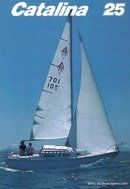
Similar sailboats that may interest you:
Sailingmates
A site for sailors, by sailors, catalina 25 used sailboat review, used sailboat review the catalina 25.
Over 5000 Catalina 25’s were produced by Catalina Yachts between 1976 and 1990. Initially the boat was a straight forward swing keel trailer-sailer, but later versions could be described as fairly sophisticated pocket cruisers for sheltered and close inshore waters.
Catalina 25’s were sold as reasonably well designed, reasonably well built yachts at a reasonable price and backed up with good customer service from the builder and agents. There is still good backup service and spare parts supply available.
The boat was offered in several rig and keel designs over the years. You can find swing keels, cast iron and lead fixed keels, wing keels and standard or tall rigs – and in any combination. However, the standard rig, swing keel, trailerable version was the most popular.
specifications
Length overall is 25’ 0”, LWL is 22’ 2”, beam is 8’ 0”, draft for the swing keel version is 2’ 8” board up and 5’ 0” board down and the fixed keel draft is 4’ 0”. Sail area is 270 sq.ft. for the standard rig and 295 sq.ft. for the tall rig.
The boat is not a racing or offshore machine, but sails reasonably well. It needs to be reefed at anything above 15 knots. Naturally the fixed lead keel model with the tall rig is the best performer, but needs to be reefed earlier. The swing keel does not provide a lot of lift and the lifting cable produces drag, but with sails properly set the boat tracks well and is easily maneuvered.
There were two interiors available as shown in the illustration and a “pop-top” was available as an optional extra up until 1987, after which it became a standard feature. There is a lot of room below for a boat this size and the “pop-top”, if fitted, gives 6’4” headroom and plenty of ventilation.
a video tour
trailer-sailing
A fully loaded boat and trailer can weigh over 6000lbs and you won’t pull it with a standard car, you’ll need a big pickup at least. Many owners trailer the fin keel versions, but you’ll need a specially fitted trailer to launch one of these. Also check the trailer weight ranking on the decal before you buy – the trailer must be designed to carry the total weight of the rig, i.e. more than 6000lbs.
You should look on the owner forums (and Youtube) for mast lowering systems, as the builder gave no directions on how to do it.
some common problems
- Hull blistering was a fairly common problem. Most would have been repaired by now, but check
- Chipped and cracked gel coat. Check that there is no delamination around the cracks.
- The original keel lifting winch tended to corrode and may need replacing
- The swing keel tends to move sideways in the keel trunk, causing a thumping noise at anchor. Catalina provides a nylon washer kit to fix this problem.
- There is a retro fit available to repair the connection of the lifting cable to the swing keel. Check this has been fitted
- Early models had closed turnbuckles on the rigging which were prone to corrosion. These should be replaced with open turnbuckles.
- Check for corroded screws and bolts on deck fittings.
- Rudder connections (gudgeons and pintles) are prone to failure. Check the forums for some tips on fixing this problem.
websites and forums
catalina yachts New England catalina association Catalina 25 International association Upgrading and repair tips Catalina 25 resources Some owner reports

Fin w/spade rudder
Specifications CAPRI 25 (CATALINA)
Home - Sailboat Listings 1980 - 24.58 ft / 7.49 m - Catalina Yachts (USA)
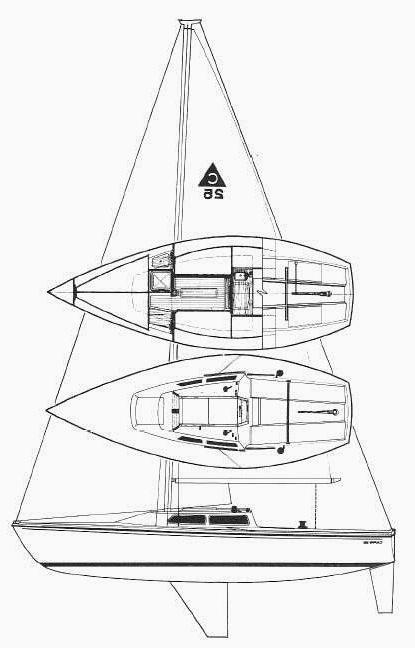
CAPRI 25 (CATALINA) Sailboat Data
Hull Type: Fin w/spade rudder Rigging Type: Masthead Sloop LOA: 24.58 ft / 7.49 m LWL: 19.16 ft / 5.84 m S.A. (reported): 276.00 ft² / 25.64 m² Beam: 9.16 ft / 2.79 m Displacement: 2,950.00 lb / 1,338 kg Ballast: 900.00 lb / 408 kg Max Draft: 4.20 ft / 1.28 m Construction: FG Ballast Type: Lead First Built: 1980 Last Built: 1986 Builder: Catalina Yachts (USA)
Information from sailboatdata.com .
Hull Speed: 5.87 kn
Catalina 25
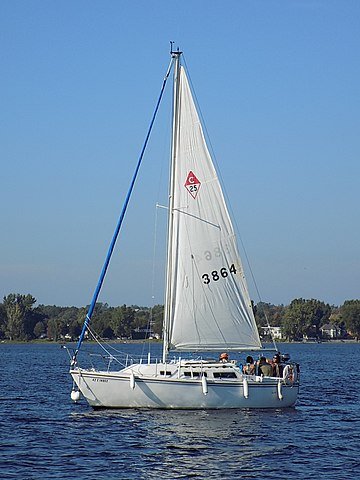
The Catalina 25 is an American trailerable sailboat, that was designed by Frank Butler and first built in 1978. The boat was built by Catalina Yachts in the United States, between 1978 and 1994. It is the most popular sailboat in this size range ever built in the US with 5866 examples completed.
The Catalina 25 is a small recreational keelboat built predominantly of fiberglass with wood for structural support and trim. It has a masthead sloop rig, a transom-hung rudder, and a fixed fin keel, fixed winged keel, or swing keel. The fin keel model has a displacement of 4,550 lb (2,064 kg) and carries 1,900 lb (862 kg) of ballast. The wing keel version has a displacement of 4,400 lb (1,996 kg) and carries 1,750 lb (794 kg) of ballast. The swing keel version has a displacement of 4,150 lb (1,882 kg) and carries 1,500 lb (680 kg) of ballast.
The boat has a draft of 4.00 ft (1.22 m) with the standard keel fitted and 2.83 ft (0.86 m) with the optional wing keel. The swing keel version has a draft of 5.00 ft (1.52 m) with the keel extended and 2.66 ft (0.81 m) with the keel retracted into the keel slot, which allows operation in shallow water and easier ground transportation on a trailer. There is also a tall rig version with a mast about 2.00 ft (0.61 m) higher.
Internal accommodations have two layouts, one with a traditional double settee and fold-down table, and the other a "dinette" table arrangement. There is a forward "V" berth and a double berth under the cockpit. The galley is located on the port side just forward of the companionway ladder. The galley is equipped with a stove, ice box and a sink. The head is located just aft of the bow cabin and includes a sink. Cabin headroom is 66 in (170 cm).
The boat is normally fitted with an outboard motor of 4 to 9.9 hp (3 to 7 kW) for docking and maneuvering. The higher horsepower outboard is useful for motoring in a current or offshore. A few of the later models were offered with inboards.
The design has a PHRF racing average handicap of 225 and a hull speed of 6.3 kn (11.7 km/h).
Source: Wikipedia . Image Credit: Wikipedia
LOA: 25.00 ft LWL: 22.17 ft Beam: 8.00 ft Draft: 4.00 ft Displacement: 4550.00 lbs Ballast: 1900.00 lbs Hull type: Fin w/transom hung rudder Hull construction: FG Rigging type: Masthead Sloop
Catalina 25 for sale in the last 12 months
Below you'll find the latest Catalina 25 listings for the last 12 months. We compare the listing price with boats listed in the past and the color coding indicates if the price is good (green = below the average listing price) or more on the expensive side (red = seller is asking more than the average listing price).
| Date | Year Country, State | Price | Details |
|---|---|---|---|
| 2024-06-12 | 1985 | USD 10000 | |
| 2024-06-10 | 1989 | USD 900 | |
| 2024-06-01 | 1984 | USD 8700 | |
| 2024-05-29 | 1988 | USD 6500 | |
| 2024-05-11 | 1989 | USD 9500 | |
| 2024-04-29 | 1985 | USD 6100 | |
| 2024-04-03 | 1985 | USD 6500 | |
| 2024-02-10 | 1989 | USD 11500 | |
| 2024-01-24 | 1981 | USD 10000 | |
| 2023-12-07 | 1986 | USD 925 | |
| 2023-10-27 | 1988 | USD 5046 | |
| 2023-10-27 | 1979 | USD 26 | |
| 2023-10-18 | 1984 | USD 10975 | |
| 2023-09-29 | 1985 | USD 7995 | |
| 2023-09-28 | 1979 | USD 3990 | |
| 2023-09-27 | 1984 | USD 10000 | |
| 2023-09-26 | 1986 | USD 7800 | |
| 2023-09-25 | 1984 | USD 12000 | |
| 2023-08-29 | 1987 | USD 7500 | |
| 2023-08-29 | 1981 | USD 4500 | |
| 2023-08-22 | 1985 | USD 1925 | |
| 2023-08-20 | 1990 | USD 9500 | |
| 2023-08-16 | 1978 | USD 265 | |
| 2023-08-13 | 1990 | USD 10900 | |
| 2023-08-05 | 1986 | USD 8000 |
Catalina 25 listing prices over time
Listing details.

IMAGES
VIDEO
COMMENTS
The most popular sailboat (in this size range) ever built in the US. Dimensions shown here are for the standard rig (pre-1988). A swing keel version was also available: draft (max.) 5.0' (min.) 2.66'; ballast 1,500lbs; displacement 4,150 lbs. Wing keel version: draft 2.83'/.86m; ballast 1,750 lbs; displacement 4,400 lbs TALL RIG: Listed SA ...
Under power, the Catalina 25 will make about 5- 1/2 knots with a 6-hp. outboard, and you can coax an extra 1/2 to 3/4 knot or so out of the boat with an 8- hp. or 9.9-hp. engine. (Theoretical maximum hull speed in ideal conditions is around 6.3 knots.) The outboard is mounted on a fold-up transom bracket mounted off center to accommodate the ...
The Catalina 25 is a 25' (7.62m) cruising sailboat designed by Frank Butler (United States). She was built between 1978 and 1994 by Catalina Yachts (United States) with 5866 hulls completed. The Swing keel version adopts an appendage configuration without compromise between draft and performance. The only drawbacks are the space taken inside and the price of the system...
The Catalina 25 is a 25' (7.62m) cruising sailboat designed by Frank Butler (United States). She was built between 1978 and 1994 by Catalina Yachts (United States) with 5866 hulls completed. The Tall rig version displays a taller mast and larger sail area. The Catalina 25 is as well listed, on Boat-Specs.com, in Fin keel, Wing keel and Swing keel version (see all the versions compared).
Catalina 25 is a 25′ 0″ / 7.6 m monohull sailboat designed by Frank V. Butler and built by Catalina Yachts between 1978 and 1994. ... This ratio is a "non-dimensional" value that facilitates comparisons between boats of different types and sizes. Read more. Formula. SA/D = SA ÷ (D ÷ 64) 2/3.
The Catalina 25 is a 25' (7.62m) cruising sailboat designed by Frank Butler (United States). She was built between 1978 and 1994 by Catalina Yachts (United States) with 5866 hulls completed. The Wing keel version is offered with a short keel fitted with large winglets. This configuration provides an interesting draft / low center of gravity / upwind performance trade-off.
270.37 sq ft (25.118 m 2) Racing; PHRF: 225: Catalina 250 → [edit on Wikidata] The Catalina 25 is an American trailerable sailboat, that was designed by Frank Butler and first built in 1978. Production. The ... The Catalina 25 is a small recreational keelboat built predominantly of fiberglass with wood for structural support and trim.
The Catalina 25 is a 25.0ft masthead sloop designed by Frank Butler and built in fiberglass by Catalina Yachts between 1978 and 1994. 5866 units have been built. The Catalina 25 is a light sailboat which is slightly under powered. It is very stable / stiff and has a good righting capability if capsized. It is best suited as a day-boat.
This video outlines the Catalina 25, who it was designed by, its use, and key specifications to take into consideration. See more specs here: https://sailboa...
The Catalina 25 is a good racer/cruiser for inland and coastal waters available on the used market at very affordable prices. This sailboat benefits from a large user base, active owner's forum, and easy availability of spare parts. Designed by Frank Butler of Catalina Yachts in Hollywood, CA, over 6,000 Catalina 25s were built from 1976 ...
Built by Catalina Yachts and designed by Frank W. Butler, the boat was first built in 1978. It has a hull type of Fin w/transom hung rudder and LOA is 7.62. Its sail area/displacement ratio 15.78. Its auxiliary power tank, manufactured by undefined, runs on undefined. CATALINA 25 has retained its value as a result of superior building, a solid ...
Sailboat Specifications Definitions Hull Type: Fin w/transom hung rudder: Rigging Type: Masthead Sloop: LOA: 25.00 ft / 7.62 m: LWL: 21.25 ft / 6.48 m: S.A. (reported): 265.00 ft² / 24.62 m² ... Catalina 25: Products: Sailboat Trailers: The Sail Warehouse: Download Boat Record:
The Catalina 25 is the Popup Camper of Sailboats. I sailed a Catalina 25 in the San Diego bay for a few hours and I liked this little sailboat. She was fairly agile in the bay and although it did not have a Knotmeter gauge, she moves fairly swiftly for a 25 ft sailboat. The Catalina 25 was built by Catalina Yachts from 1978 to 1994.
The Catalina 25 is an American trailerable sailboat, that was designed by Frank Butler and first built in 1978. It is the most popular sailboat (in this size range) ever built in the US. Catalina Yachts is one of the biggest boat designers and manufacturers in the world. This Catalina 25, Double Diamond, has both premium extra features: The ...
Sailboat specifications. The Catalina 25 is a 25' (7.62m) cruising sailboat designed by Frank Butler (United States). She was built between 1978 and 1994 by Catalina Yachts (United States) with 5866 hulls completed. The Fin keel version adopts a classical fin configuration, the easiest option to provide a low center of gravity.
Used Sailboat Review The Catalina 25 Over 5000 Catalina 25's were produced by Catalina Yachts between 1976 and 1990. Initially the boat was a straight forward swing keel trailer-sailer, but later versions could be described as fairly sophisticated pocket cruisers for sheltered and close inshore waters. Catalina 25's were sold as reasonably well designed, reasonably
2006 Catalina 310. US$59,900. United Yacht Sales - South Carolina / North Carolina Area | Henderson, North Carolina.
Notes. With more than 6000 sold, the Catalina 30 is one of the most successful production sailing yachts in history. During the long production run of this basic model there were a great number of variations with standard and tall rig configurations, each with a bowsprit option, and also including shoal, wing and deep fin keels.
CAPRI 25 (CATALINA) Sailboat Data Hull Type: Fin w/spade rudder Rigging Type: Masthead Sloop LOA: 24.58 ft / 7.49 m LWL: 19.16 ft / 5.84 m S.A. (reported): 276.00 ft² / 25.64 m² Beam: 9.16 ft / 2.79 m Displacement: 2,950.00 lb / 1,338 kg Ballast: 900.00 lb / 408 kg Max Draft: 4.20 ft / 1.28 m Construction: FG Ballast Type: Lead First Built ...
Founded by Frank Butler. In sheer numbers sold, Catalina Yachts is certainly the most successful builder of sailboats ever in the US, and possibly the world. Time line extract from the company's website: July 1969-Catalina's first model, the Catalina 22, is built in North Hollywood, CA. Company owner Frank Butler hopes to build 100 boats if all goes well. March 1970-Catalina's second ...
The Catalina 25 is an American trailerable sailboat, that was designed by Frank Butler and first built in 1978. ... Specs. LOA: 25.00 ft LWL: 22.17 ft Beam: 8.00 ft Draft: 4.00 ft Displacement: 4550.00 lbs Ballast: ... We compare the listing price with boats listed in the past and the color coding indicates if the price is good (green = below ...
1983 Catalina 25. $4,997. ↓ Price Drop. Coconut Grove, FL 33133 | Private Seller. <. 1. >. Find Catalina 25 boats for sale near you, including boat prices, photos, and more. Locate Catalina boat dealers and find your boat at Boat Trader!
Catalina 25 preowned sailboats for sale by owner. Catalina 25 used sailboats for sale by owner. Home. Register & Post. View All Sailboats. Search. Avoid Fraud. ... 32' Bayfield 32C 32 ft Cutter Costa Del Sol El Salvador Asking $8,000. 22' Hinterhoeller Nonsuch 22 Punta Gorda, Florida Asking $24,900. 32.83' Beneteau Oceanis 323